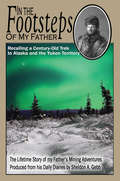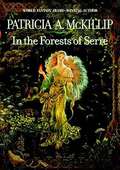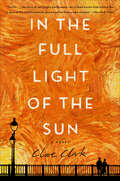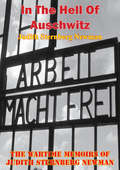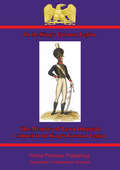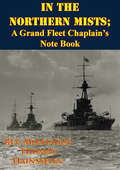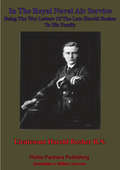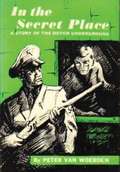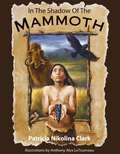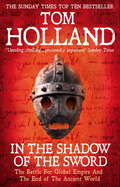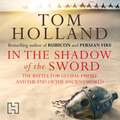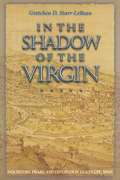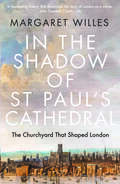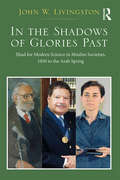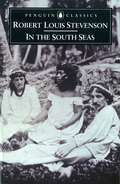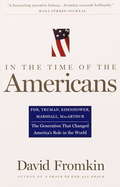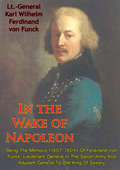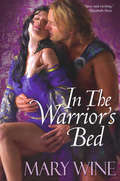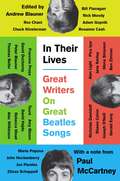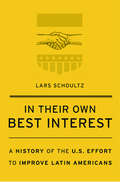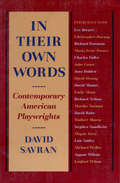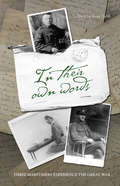- Table View
- List View
In The Footsteps of My Father: Recalling a Century-Old Trek to Alaska and the Yukon Territory
by Sheldon GebbLive life in the Alaska and the Yukon more than one hundred years ago through my father's diary, which details the hard work, frustrations and horseplay in the development of Guggenheim's mammoth gold dredge mining operation. Ponder his decision to quit a comfortable job as a mining engineer to venture 60 miles east of Dawson City with the King of the Klondike to endure, without fear, the coldest winter on record averaging minus 50 degrees. Question through his words the unsuccessful digging of a mine shaft through frozen ground ending with the comment, "April Fool's Day. We're down 160 feet in the shaft and no gold. April Fools proper-that is what we are. We are up against the fact we can remain no longer. We have no grub." Experience his comical adventures as a bear hunter finally giving up to seek employment at the Kennecott Copper Mine; electing to cross the largest ice fields in North America alone, guided by instinct, with only a woman's robe and a tarp for warmth.
In The Forests Of Serre
by Patricia A. MckillipIn the tales of World Fantasy Award-winning author Patricia McKillip, nothing is ever as it seems. A mirror is never just a mirror; a forest is never just a forest. Here, it is a place where a witch can hide in her house of bones and a prince can bargain with his heart...where good and evil entwine and wear each others' faces... and where a bird with feathers of fire can quench the fiercest longing...
In The Full Light Of The Sun: A Novel
by Clare ClarkBased on a true story, this gorgeous novel follows the fortunes of three Berliners caught up in an art scandal—involving newly discovered van Goghs—that rocks Germany amid the Nazis&’ rise to power.In the turbulent years between the wars, nothing in Berlin is quite what it seems. Not for Emmeline, a wayward young artist freewheeling wildly through the city in search of meaning. Not for Julius, an eminent art connoisseur who finds it easier to love paintings than people. And most definitely not for Frank, a Jewish lawyer who must find a way to protect his family and his principles as the Nazis begin their rise to power. But the greatest enigma of them all is Matthias, the mercurial art dealer who connects them all. Charming and ambitious, he will provoke a scandal—involving newly discovered paintings by Vincent van Gogh—that turns all of their lives upside down. Inspired by true events, this brilliant, humane novel peels back the cherished illusions that sustain us to reveal the truths beneath. A book about beauty and justice, vanity and self-delusion, it asks: Do we see only what we want to see? Even in the full light of the sun?
In The Hell Of Auschwitz; The Wartime Memoirs Of Judith Sternberg Newman [Illustrated Edition]
by Judith Sternberg NewmanIncludes 204 photos, plans and maps illustrating The HolocaustDespite the Nazi oppression of all Jews in the lands under their control, Judith Sternberg Newman and her family were hugely fortunate to have managed get permission to settle in Paraguay in 1940. However their escape was blocked by the German authorities who refused to provide an exit visa, from that moment on, as the author notes, "fate turned against us". As the author relates in these horrific memoirs are the torments, brutality and death at Auschwitz; the treatment that left here by the end of the war as the only surviving member of her family. She emigrated to America in 1947 where she was able to practise at her chosen profession in nursing and raise a family.
In The King’s German Legion: Memoirs Of Baron Ompteda, Colonel In The King’s German Legion During The Napoleonic Wars
by Freiherr von Ludwig Ompteda Freiherr von Christian OmptedaColonel Baron Christian Ompteda, 1765-1815, was one of the most distinguished Hanoverian officers of the Napoleonic period. He served in the Netherlands in 1793-5 and was orderly to the Duke of York, but he was wounded and suffered the first of his mental breakdowns. One of the early members of the King's German Legion, he commanded the 1st Line Battalion and was exchanged after being shipwrecked on the Dutch coast in 1807. He sailed for the Peninsula in 1808 but a further bout of mental instability led to his retirement. His friend Scharnhorst helped his recovery, Ompteda rejoined the Legion as commander of the 1st Light Battalion in 1812, serving through the remainder of the Peninsular War which included the Battle of Vittoria, the storm of Tolosa, the siege of San Sebastian, fighting on the Nive, and the siege of Bayonne, 1814.In the Hundred Days campaign, he commanded the 2nd K. G. L. Brigade, which included his own 5th Line Battalion. At Waterloo, ordered by the Prince of Orange and Alten to make a suicidal attack, he calmly drew his sword, asked a friend to try to save his nephews, and rode off at the head of his men. As he had realised, the order resulted in the near destruction of his battalion but he carried it out without hesitation and was last seen surrounded by French troops. Shot through the neck, his body was recovered and buried near the gate of La Haye Sainte.
In The Northern Mists; A Grand Fleet Chaplain’s Note Book [Illustrated Edition]
by Rev Montague Thomas HainsselinIncludes The First World War At Sea Illustrations Pack with 189 maps, plans, and photos.Although written under anonymously, the writer of the famous quartet of famous First World War sea-reportage novels, was identified as Rev. Montague T. Hainsselin. He was appointed to the chaplaincy of the Royal Navy in 1903, although he had been almost born into the Navy having raised in Plymouth. He served on many ships in his long career, from battlecruisers to the huge superdreadnoughts in the Mediterranean, Home and Channel Fleets. During the First World War he served in the Home Fleet based in Scapa Floe and was present at the only major sea-battle of the war at Jutland. Few men were been appointed so well as the Chaplain to report the inner workings of the Royal Navy from the lowliest stoker in the boiler room to the officers commanding entire behemoths of steel. Observant and witty, Rev. Hainsselin offers a view of the Royal Navy at War that has rarely been surpassed.Reviews of IN THE NORTHERN MISTS"Nothing, so far as one can remember, gives as good an idea as this book does of life in the Royal Navy in time of war."--World. "Full of intimate touches, and full of good stories of quarter-deck and lower-deck.... The Padre is a man of infinite humour, as all truly religious men are. There is not a line of preaching in his book, an there is many a good yarn, but, for all that, it is a good book, it is a book of manliness and cleanliness and godliness. Read his one little incursion into religion, 'Strad Cords,' and you will love him for a practical muscular Christian."--Daily Express."The unnamed Padre ... tells us a great deal about the little ways of the Services, the psychology of its members, and the spirit that animates them; and always in a style so entertaining as well as sympathetic that these pages from his note-hook should prove one of the most popular and appreciated of books that the war has directly or indirectly inspired."--Scotsman.
In The Royal Naval Air Service: Being The War Letters Of The Late Harold Rosher To His Family
by Lieutenant Harold Rosher R.N."A war in the skies above the wavesAs early as 1908 the Royal Navy understood the potential for the use of aircraft in naval warfare. By 1914 the Royal Naval Air Service consisted of 93 aircraft, 6 airships, 2 balloons and 727 personnel. By 1918 when the RNAS was combined with the RAF it had nearly 3,000 aircraft and more than 55,000 personnel. Aircraft working in concert with the Royal Navy and against enemy shipping and coastal installations had come to stay. This interesting book looks at the RNAS from a much more personal perspective-that of one young navy pilot, Harold Rosher. The book tells the story of Rosher's war, based around Dover and engaged in patrolling over and across the English Channel and attacking enemy held coastal defences such as Zeebrugge, principally through letters to his family and provides vital insights into the First World War in the air as experienced by an early naval pilot."-Leonaur Print Version.Author -- Lieutenant Harold Rosher R.N., 1893-1916.Text taken, whole and complete, from the edition published in New York: Macmillan, 1916.Original Page Count - 149 pages.
In The Secret Place: A Story Of The Dutch Underground
by Peter Van WoerdenPeter Van Woerden, Corrie Ten Boom’s nephew, began his career in the Dutch underground in 1942. He was the organist of the Reformed Church in Velsen and was at his regular post on the bench one Lord’s Day morning as he recounts:“On this particular Sunday, as I sat and mused, I suddenly realized that exactly two years before, on the 10th of May, the Nazi invasion of Holland had begun. As I looked over the congregation I decided that something should be done, something on this Sunday morning to demonstrate that we still were real Dutchmen at heart, something to express our faith and hope in a day of victory when we would again be a free people. The sermon over, I pulled extra stops out on the organ, then firmly and distinctly played the first chords of the Wilhelmus, the national anthem of the Netherlands. There was a rustling downstairs. People stood to their feet. One voice began to sing, then another, and others; and soon, like a mighty sea, the glorious old hymn rolled forth from the overflowing hearts of hundreds of Hollanders as tears streamed down their faces. For that one moment we were a free people in the midst of a dark world full of oppression and persecution.”That gesture landed Peter in prison where, in turn, he experienced, for the first time in his life, a deep hunger for God. After years in the church he met Christ and was truly converted. And thus an adventure in which Peter evaded the Nazis many months until the night he went to grandfather and Aunt Corrie.
In The Shadow Of The Mammoth
by Patricia Nikolina Clark Anthony Alex LetourneauAt eleven summers, Zol approaches manhood in his clan of Ice Age Hunters. He should be eager for his first mammoth hunt, but shameful fear gnaws at his insides like a hungry rat. Fear of disgracing his brave father’s memory drives Zol to prove himself worthy of the Star Dancer clan. In his quest for courage, Zol barely escapes death in a raging river, stands face-to-face with a young mammoth, and survives two attacks by a long-toothed cat. Zol gains confidence from these encounters. But will his new-found courage stand the test of the mammoth hunt?
In The Shadow Of The Sword: The Battle for Global Empire and the End of the Ancient World
by Tom HollandIn this 'thrilling. . .profoundly important book' (Christopher Hart, Sunday Times) and Sunday Times Top Ten Bestseller, the acclaimed author of Rubicon gives a panoramic-and timely-account of the rise of IslamIn the 6th century AD, the Near East was divided between two great empires: the Persian and the Roman. A hundred years on, and one had vanished for ever, while the other was a dismembered, bleeding trunk. In their place, a new superpower had arisen: the empire of the Arabs. So profound was this upheaval that it spelled, in effect, the end of the ancient world.But the changes that marked the period were more than merely political or even cultural: there was also a transformation of human society with incalculable consequences for the future. Today, over half the world's population subscribes to one of the various religions that took on something like their final form during the last centuries of antiquity. Wherever men or women are inspired by belief in a single god to think or behave in a certain way, they bear witness to the abiding impact of this extraordinary, convulsive age - though as Tom Holland demonstrates, much of what Jews, Christians and Muslims believe about the origins of their religion is open to debate.In the Shadow of the Sword explores how a succession of great empires came to identify themselves with a new and revolutionary understanding of the divine. It is a story vivid with drama, horror and startling achievement, and stars many of the most remarkable rulers ever seen.'A compelling detective story of the highest order, In the Shadow of the Sword is also a dazzlingly colourful journey into the world of late antiquity. Every bit as thrilling a narrative history as Holland's previous works, In the Shadow of the Sword is also a profoundly important book. It makes public and popular what scholarship has been discovering for several decades now; and those discoveries suggest a wholesale revision of where Islam came from and what it is' (Christopher Hart, Sunday Times)
In The Shadow Of The Sword: The Battle for Global Empire and the End of the Ancient World
by Tom HollandIn this 'thrilling. . .profoundly important book' (Christopher Hart, Sunday Times) and Sunday Times Top Ten Bestseller, the acclaimed author of Rubicon gives a panoramic-and timely-account of the rise of IslamIn the 6th century AD, the Near East was divided between two great empires: the Persian and the Roman. A hundred years on, and one had vanished for ever, while the other was a dismembered, bleeding trunk. In their place, a new superpower had arisen: the empire of the Arabs. So profound was this upheaval that it spelled, in effect, the end of the ancient world.But the changes that marked the period were more than merely political or even cultural: there was also a transformation of human society with incalculable consequences for the future. Today, over half the world's population subscribes to one of the various religions that took on something like their final form during the last centuries of antiquity. Wherever men or women are inspired by belief in a single god to think or behave in a certain way, they bear witness to the abiding impact of this extraordinary, convulsive age - though as Tom Holland demonstrates, much of what Jews, Christians and Muslims believe about the origins of their religion is open to debate.In the Shadow of the Sword explores how a succession of great empires came to identify themselves with a new and revolutionary understanding of the divine. It is a story vivid with drama, horror and startling achievement, and stars many of the most remarkable rulers ever seen.'A compelling detective story of the highest order, In the Shadow of the Sword is also a dazzlingly colourful journey into the world of late antiquity. Every bit as thrilling a narrative history as Holland's previous works, In the Shadow of the Sword is also a profoundly important book. It makes public and popular what scholarship has been discovering for several decades now; and those discoveries suggest a wholesale revision of where Islam came from and what it is' (Christopher Hart, Sunday Times)
In The Shadow Of The Sword: The Battle for Global Empire and the End of the Ancient World
by Tom HollandIn the 6th century AD, the Near East was divided between two venerable empires: the Persian and the Roman. A hundred years on, and one had vanished forever, while the other seemed almost finished. Ruling in their place were the Arabs: an upheaval so profound that it spelt, in effect, the end of the ancient world. In The Shadow of the Sword, Tom Holland explores how this came about. Spanning Constantinople to the Arabian desert, and starring some of the most remarkable rulers who ever lived, he tells a story vivid with drama, horror and startling achievement.
In The Shadow Of The Virgin: Inquisitors, Friars, And Conversos In Guadalupe, Spain
by Gretchen D. Starr-LeBeauIn the Shadow of the Virgin is unique in pointing out that the power of the Inquisition came from the collective participation of witnesses, accusers, and even sometimes its victims. For the first time, it draws the connection between the malleability of religious identity and the increase in early modern political authority. It shows that, from the earliest days of the modern Spanish Inquisition, the Inquisition reflected the political struggles and collective religious and cultural anxieties of those who were drawn into participating in it.
In The Shadow of St. Paul's Cathedral: The Churchyard that Shaped London
by Margaret WillesThe extraordinary story of St. Paul’s Churchyard—the area of London that was a center of social and intellectual life for more than a millennium St. Paul’s Cathedral stands at the heart of London, an enduring symbol of the city. Less well known is the neighborhood at its base that hummed with life for over a thousand years, becoming a theater for debate and protest, knowledge and gossip. For the first time Margaret Willes tells the full story of the area. She explores the dramatic religious debates at Paul’s Cross, the bookshops where Shakespeare came in search of inspiration, and the theater where boy actors performed plays by leading dramatists. After the Great Fire of 1666, the Churchyard became the center of the English literary world, its bookshops nestling among establishments offering luxury goods. This remarkable community came to an abrupt end with the Blitz. First the soaring spire of Old St. Paul’s and then Wren’s splendid Baroque dome had dominated the area, but now the vibrant secular society that had lived in their shadow was no more.
In The Shadows of Glories Past: Jihad for Modern Science in Muslim Societies, 1850 to The Arab Spring
by John W. LivingstonThe title of this volume implies two things: the greatness of the scientific tradition that Muslims had lost, and the power of the West, in whose threatening shadow reformers now labored to modernize in order to defend themselves against those very powers they were taking as models. Copernicus and Darwin were the names that dominated the debate on science, whose arguments and rebuttals were published mainly in the religious and secular journals in Cairo and Beirut from the 1870s. Analysis and interpretation of this literature shows the hope that Arab reformers had of duplicating the Japanese success, followed by the despair when success was denied. A cultural malaise festered from generations of despair, defeat and foreign occupation, and this feeling transmogrified after 1967 to a psychosis in a significant number of secular writers, educators and religious reformers. The great debate on assimilating science was turned inward where defensive mechanisms of denial spun out perversions of science: the Quran becoming a thesaurus of science; and a more extreme derivative of that, something called "Islamic Science," arising as an alternate science that was to be in harmony with the Quran, Shari’a and Muslim belief. This volume reveals the undermining effect of European imperialism on western-oriented religious reformers and secular intellectuals, for whom science and political reform went together, and concludes with a chapter on the state of science in contemporary Muslim societies and the efforts to institutionalize science (before the upheavals of 2011) so as to bring to life an authentic and indigenous culture that would sustain scientific study and research as autonomous pursuits.
In The South Seas
by Robert Louis Stevenson Neil RennieIN THE SOUTH SEAS records Stevenson's travels with his wife Fanny and their family in the Marquesas, the Paumotus and the Gilbert Islands during 1888-9. Originally drafted in journal form while Stevenson travelled, it was then ambitiously rewrittento describe the islands and islanders as well as Stevenson's own personal experiences. IN THE SOUTH SEAS was published posthumously in 1896. Its combination of personal anecdote and historical account, of autobiography and anthropology, of Stevenson and South Sea Islands, has a particular charm.
In The Spinster's Bed (Spinster House)
by Sally MackenzieAt Spinster House, a woman can enjoy the spoils of single life--or find the love of a lifetime... It has been twenty years since Lord William Wattles laid eyes on Annabelle Frost. Still, he remembers everything--her ethereal beauty, her bookish intelligence, her surprisingly modern attitudes about love...and lust. But Belle's allegedly wanton behavior led her father to send her away to save the family's reputation. Now she resides at Spinster House in the village of Loves Bridge, where an unmarried lady can live--and in Belle's case, support herself as a librarian--in peace... Beautiful, passionate Belle--sworn off marriage? William can't believe the woman he once knew could end up like this. But when the hands of fate bring him to Loves Bridge, his long-lost love might just end up back in his arms. Is their unwavering desire worth the sweeping scandal that is sure to follow them both? Absolutely.
In The Time Of The Americans
by David FromkinComing of age during World War I and attaining their finest hour in World War II and the Cold War, these men -- FDR, Truman, Eisenhower, Marshall, MacArthur -- transformed America from an isolated frontier nation into a global superpower. As he tells their stories, Fromkin, author of A Peace to End All Peace, shows how this generation not only made America great but largely succeeded in making it a force for good.
In The Wake Of Napoleon, Being The Memoirs (1807-1809) Of Ferdinand Von Funck, (1807-1809) Of Ferdinand Von Funck,: Lieutenant-General In The Saxon Army And Adjutant-General To The King Of Saxony
by Lt.-General Karl Wilhelm Ferdinand von Funck Philip Henry Oakley Williams Artur BrabantFerdinard von Funck (1761-1828) was born into sleepy Saxony, securely moored in a backwater of the eighteenth century, during the long reign of Frederick Augustus, the world forgetting it and only anxious to be by the world forgot. Even the ferment of the French Revolution had hardly ruffled its stagnant calm. Into this idyll of the eighteenth century burst Napoleon in full career with the methods of the nineteenth century in a hurry--as the progress of some high-powered modern tug in midstream leaves the heavy craft, moored against the bank, swaying and creaking waterlogged in its wash. By this time von Funck was a senior general in the newly re-organized Saxon army and Adjutant-general to Frederick Augustus, who had recently been raised to the dignity of a king for throwing his lot in with Napoleon. A very astute and balanced witness, the author has left a snapshot of Napoleon and his empire building at its apogee.As the title of the memoirs suggests, the record that General von Funck has left to posterity is that of the new Kingdom of Saxony, as he and his people struggled to come to terms with the full ramifications of being allied to Napoleon. Filled with anecdotes of the new King, his court, Napoleon and his senior ministers, the pages are a witty and full of interest. The memoirs were considered to be so explosive that they were not even published in Germany until 1928 with an English translation produced soon afterward.
In The Warrior's Bed
by Mary WineIn this irresistible follow-up to her captivating debut, In Bed With a Stranger, Mary Wine revisits the McJames clan--their loves, their battles, their conquests. . .Cullen McJames will not have his honor sullied, certainly not by his clan's nemesis Laird Erik McQuade. So when McQuade tells the Court of Scotland that Cullen has stolen his daughter's virtue, Cullen steals the daughter instead. Since his brother wed a fetching lass, Cullen's been thinking he too needs a wife. A marriage could end the constant war between the clans. And looking on Bronwyn McQuade but once has put her in his dreams for a week. . . But Bronwyn won't go quietly. She won't be punished for what she did not do. Nor is she eager to live among the resentful veterans of McQuade wars. And however brave and beautiful a man Cullen may be, he has much to learn about a woman's fighting spirit. But as Bronwyn will discover, he has much to teach her as well. . ."My kind of historical!... Sweeps you into the time period without taking a thing away from delightful characters and a charming romance. . .definitely a must-read." --Heather Graham on In Bed With a Stranger
In Their Lives: Great Writers on Great Beatles Songs
by Andrew BlaunerFor readers who loved Tune In and Nick Hornby’s Songbook, an anthology of essays from a chorus of twenty-nine luminaries singing the praises of their favorite Beatles songs. The Beatles’ influence—on their contemporaries, on our cultural consciousness, and on the music industry ever after—is difficult to overstate. We all have a favorite song from the band that made us want to fall in love, tune in, and follow our dreams. Arranged chronologically by the date of the song’s release, these essays highlight both the Beatles’ evolution as well as the span of generations their music affected. From Beatlemaniacs who grew up listening to the iconic albums on vinyl to new fans who download the songs on iTunes, each contributor explores a poignant intersection between Beatles history and personal history. With contributions from twenty-nine authors and musicians—Roz Chast on “She Loves You,” Jane Smiley on “I Want to Hold Your Hand,” Rosanne Cash on “No Reply,” Gerald Early on “I’m a Loser,” Rick Moody on “The End,” Maria Popova on “Yellow Submarine,” David Duchovny on “Dear Prudence,” Chuck Klosterman on “Helter Skelter,” David Hadju on “You Know My Name (Look Up the Number),” and more—the breadth of the band’s impact is clear. From musings on young love and family strife to explorations of racial boundaries and identity, these essays pay tribute to a band that ran the gamut of human experience in a way no musical group has done before or since.Timed for the fiftieth anniversary of the release of Sgt. Pepper’s Lonely Hearts Club Band, this anthology captures the full spectrum of reasons fans still love the Fab Four after all these years.
In Their Own Best Interest: A History of the U.S. Effect to Improve Latin Americans
by Lars SchoultzFor over a century the U.S. has “improved” the peoples of Latin America by promoting everything from representative democracy and economic development to oral hygiene. How did this paternalistic practice evolve and spread globally and what are the troubling consequences for a country with a habit of giving—and for others with a habit of receiving?
In Their Own Words
by David SavranIncludes: Lee Breuer, Christopher Durang, Richard Foreman, Maria Irene Fornes, Charles Fuller, John Guare, Joan Holden, David Henry Hwang, David Mamet, Emily Mann, Richard Nelson, Marsha Norman, David Rabe, Wallace Shawn, Stephen Sondheim, Megan Terry, Luis Valdez, Michael Weller, August Wilson and Lanford Wilson.
In Their Own Words
by Jeanette BeerIn Their Own Words examines early medieval history-writing through quotation practices in five works, each in some way the first of its kind. Nithard's Historiae de dissensionibus filiorum Ludovici Pii is extraordinary for its quotation of vernacular oaths, the first recorded piece of French. The Gesta Francorum is the first eye-witness account of the First Crusade. Geoffrey of Villehardouin's La Conquête de Constantinople, written by a leader and negotiator of the Fourth Crusade, and Robert de Clari's La Conquête de Constantinople, written by a common soldier in the same crusade, are the first extant French prose histories. Li Fet des Romains, a translation and compilation of all the classical texts about Julius Caesar (including Caesar's own Gallic Wars) that were known in the thirteenth century, is the first work of ancient historiography and the first biography to appear in French.Jeanette Beer's work bridges the divide between the study of vernacular and Latin writing, providing new evidence that the linguistic cultures were not isolated from each other. Her examination of quotation practices in early medieval histories illuminates the relationship between classical and contemporary influences in the formative period of history-writing in the West.
In Their Own Words: Three Maritimers Experience the Great War
by Ross HebbA historian examines the letters written by three residents of Canada&’s Maritime provinces during their service in World War I. What was the First World War really like for Maritimers overseas? This epistolary book, edited by historian Ross Hebb, contains the letters home of three Maritimers with distinct wartime experiences: a front-line soldier from Nova Scotia, a nurse from New Brunswick, and a conscripted fisherman from Prince Edward Island. Up until now, these complete sets of handwritten letters have remained with the families who agreed to share them in time for the one-hundredth anniversary of the Great War&’s end in 2018. These letters not only give insight into the war, but also provide greater understanding of life in rural Maritime communities in the early 1900s. In Their Own Words includes a learned introduction and background information on letter writers Eugene A. Poole, Sister Pauline Balloch, and Harry Heckbert, enabling readers to appreciate the context of these letters and their importance. A welcome companion to Hebb&’s earlier book, Letters Home: Maritimers and the Great War; 1914–1918.
